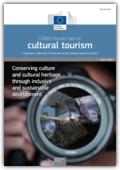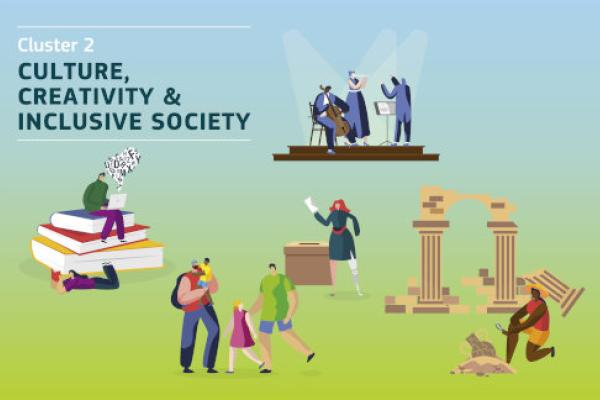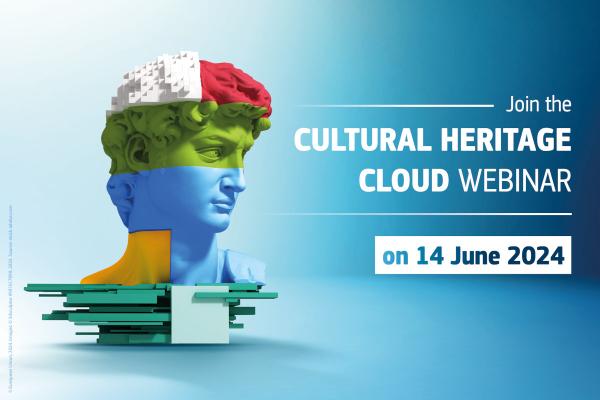Why Cultural Heritage and Cultural and Creative Industries are important
Cultural Heritage and Cultural and Creative Industries form a backbone of the EU's sustainable growth, social cohesion and competitiveness, playing a pivotal role in forging more resilient and inclusive European societies.
Europe's cultural heritage sparks creativity, fosters wellbeing, contributes to prosperity and foments a sense of belonging. Although policy in this area is primarily the responsibility of Member States, the EU is committed to safeguarding and enhancing cultural heritage as well as to strengthening European cultural and creative industries through various targeted initiatives and funding programmes.
Research and innovation are crucial to find evidence-based solutions to preserve and promote Europe’s Cultural Heritage and to support the sustainable competitiveness of the Cultural and Creative Industries. By supporting research and cooperation between scientists, stakeholders and professionals, the EU contributes to unlocking the full potential of Europe’s cultural heritage and cultural and creative industries to harness their transformative impact and competitive potential.
Activities under Horizon Europe
Under the previous research and innovation framework programme, Horizon 2020, more than €600 million was invested in research and innovation actions related to cultural heritage and the cultural and creative industries. A policy review titled Innovation in Cultural Heritage Research (March 2018) describes cutting-edge developments around these actions. Many success stories illustrate how research and innovation for culture and creativity strengthen and unite our societies.
Horizon Europe has dedicated a specific intervention area to innovative research on “European Cultural Heritage and the Cultural and Creative Industries”, placed under Cluster 2 “Culture, Creativity and Inclusive Society”. With a budget of €2.28 billon, of which around one third will go to cultural heritage and CCI related actions, this cluster aims to create a more resilient, inclusive and democratic European society.
This is outlined in the Specific Programme Decision and the Horizon Europe Strategic Plans (2021-2024 and 2025-2027) as well as in successive work programmes with calls for proposals, which are available in the Funding and Tenders Portal. the Horizon Europe Strategic Plans (2021-2024 and 2025-2027) as well as in successive work programmes with calls for proposals, which are available in the Funding and Tenders Portal.
Objectives
The Horizon Europe Cluster 2 destination 2 ‘Innovative research on European Cultural Heritage and the Cultural and Creative Industries’ aims to achieve the following impact:
The full potential of cultural heritage, arts and cultural and creative industries and sectors as drivers of both sustainable innovation and a European sense of belonging is realised through a continuous engagement with society, citizens and economic sectors.
To this end, a series of actions to support research and innovation have been launched, to achieve objectives along the following lines:
Cultural and creative industries (CCIs) are at the heart of the creative economy. CCIs present a higher share of startups than in other industrial sectors, contributing to innovation, prosperity, competitiveness and global influence. CCIs are innovation catalysts across the wider economy and society: creativity and innovation have made some of the European CCIs world leaders, with substantial spillover effects into other sectors of the economy. Moreover, their cultural influence can encourage desirable societal shifts, e.g. towards circular practices.
Despite being a lively and dynamic sector, however, European CCIs are highly fragmented and often economically vulnerable,struggling to scale up and to address the challenges they are confronted with, from the digital and green transition to access to finance, from managerial, entrepreneurial and tech skills, to networking and access to a coherent ecosystem. Research is key to better understand such crucial challenges for the future of EU competitiveness, to find solutions that fully leverage the CCIs’ potential for cross-sector innovation, to understand issues at stake for the future of creative work and to support CCIs contributions to ethical, human-centred AI developments.
This destination has launched an array of research and innovation actions aimed at supporting culture and creativity driven innovation and competitiveness.
Cluster 2 funds an array of research and innovation actions aimed at supporting culture and creativity driven innovation and competitiveness. Projects aim to explore the contribution of CCIs to EU competitiveness, to mobilise the CCIs for a sustainable climate transition, to leverage the digital transition for CCI competitiveness, and to support innovation in specific CCI sectors such as music, filmmaking, or videogames. Innovation and sustainable development are promoted also by bringing together traditional knowledge and new technologies in the crafts sector and by fostering socio-economic development in rural areas through cultural tourism.
Cluster 2 is also supporting a collaborative platform aimed at strengthening a culture and creativity driven European innovation ecosystem, whose outcomes will later feed into the EIT Knowledge and Innovation Community (KIC) on Culture and Creativity.
It also contributes to the New European Bauhaus initiative through boosting innovation aimed at shaping a greener and fairer way of life in creative and inclusive societies through architecture, design and the arts.
Preservation, conservation and access to cultural heritage involve major challenges requiring constant innovation in approaches, methods and materials. Research and innovation open new avenues to better safeguarding and preserving European cultural heritage and to enabling the current and future generations to fully enjoy it and benefit from its richness.
Research aims to boost preservation of cultural heritage and improve access for everyone. Research and innovative tools can also enhance heritage management and conservation efforts and promote sustainable practices across Europe.
Areas supported by research and innovation funding:
- Effects of climate change and natural hazards: mitigation, adaptation. Research and innovation are helping to create a more sustainable future for cultural heritage. Projects funded under this Destination contribute to explore innovative and sustainable ways to safeguard and protect Europe’s cultural heritage and cultural landscapes from the effects of climate change and natural hazards and man-made threats. Research is funded to contribute to the objectives of the European Green Deal. Selected projects develop sustainable and environmentally friendly methods and materials for the conservation, preservation and restoration of monuments and artefacts. Higher quality standards are expected to be set for the conservation and restoration of Europe's rich cultural heritage. Have a look at the video created by the EU-funded project Greenart.
- Monitoring degradation. EU-funded research projects seek to explore innovative and sustainable ways to safeguard and protect Europe’s cultural heritage and cultural landscapes from the effects of climate change, natural hazards and man-made threats. By developing new green and effective conservation strategies and materials, historic monuments and artefacts can be better preserved, conserved and restored, while also reducing our environmental impact.
- Protection from anthropogenic threats: these projects are developing non-destructive methods and digital tools for the protection, identification and traceability of cultural goods.
The project Alliance for Research on Cultural Heritage in Europe (ARCHE) is developing a Strategic Research and Innovation Agenda for cultural heritage. ARCHE is laying the foundation for a co-funded European Partnership between the EU and its Member States on research at the nexus of heritage science and climate change science. The full draft proposal for the Resilient Cultural Heritage Partnership can be consulted at European Partnerships under the Horizon Europe strategic plan 2025-2027.
Tackling trafficking in cultural goods
With thousands of artefacts and artworks stolen or looted every year, protecting cultural goods against illicit trafficking and trade is a pressing issue. Researchers and practitioners are joining forces to develop innovative solutions and technologies that help identify and recover stolen objects, also concretely supporting law enforcement agencies.
- Find out more about the EU projects funded under Protection of artefacts and cultural goods from anthropogenic threats (europa.eu) in 2022
- Horizon Magazine article on Museums and police in Europe join forces to fight illicit trade in artefacts (2023)
- Factsheet on innovations for combatting trafficking in cultural goods (2024)
Strengthening the European linguistic capital
Preserving linguistic diversity is important because languages are an essential part of European culture and identity, and their loss would lead to a significant impoverishment of our shared heritage. As many regional and minority languages are facing extinction, it is urgent to study, preserve and promote them. Research can support the intergenerational transmission of lesser-used languages, create attractive tools for new generations, and propose measures to the relevant authorities to revitalise endangered languages.
- Find out more about the EU projects funded under Strategies to strengthen the European linguistic capital in a globalised world in 2024, Safeguarding endangered languages in Europe (europa.eu) in 2022.
The digital age offers new opportunities to cultural heritage research and institutions, but also serious challenges and threats. To harness the potential of digital technologies, the cultural heritage sector needs innovative solutions, methods and platforms that support advanced collaboration and co-creation in a secure environment, that also allows smaller organisations with less resources to enter the digital age, and that help institutions to use digital technologies in a responsible way.
Through research and innovation, we can support the development of new technologies and methods that help conserve, digitise and curate cultural assets, increase online access to cultural resources, and boost innovation in creative industries, alongside other aspects.
The European Collaborative Cloud for Cultural Heritage
Our flagship initiative to unlock the digital opportunities for Europe’s researchers and cultural heritage professionals is the European Collaborative Cloud for Cultural Heritage, or the Cultural Heritage Cloud; a unique infrastructure for transdisciplinary collaboration among specialists, with cutting-edge technologies for digitisation of artefacts, researching artworks, and documenting data, among many other things.
More information on the Cultural Heritage Cloud.
Cultural heritage can bring people together and promote social cohesion. By combining research and innovation, we can make heritage more accessible and inclusive, helping to build a more equal and fairer society.
Citizens' Perspectives: Cultural Heritage, Perceptions, and the Future of European Societies
Cultural heritage is also a dynamic and transformative force that shapes our identity, sense of belonging, and understanding of the past.
By acknowledging its constantly changing nature, research can help citizens make sense of rapid societal transformations and approach the future with confidence. Despite its potential, the transformative nature of cultural heritage remains understudied, highlighting the need for deeper research and effective, sustainable methods to promote a broader understanding of its impact. For this reason, we fund EU projects to analyse different study cases to enable citizens to face societal transformations with greater confidence.
Research projects are also funded to deepen understanding of the role of perceptions, formed by traditions, values and beliefs, in shaping European societies and politics in the 21st century. Research is needed to explore how people's perceptions change over time, under different circumstances, and in response to crises such as the COVID-19 pandemic. This research aims to explore how values and social behaviours influence our response to crises, and provide guidance on how to address these differences in EU policymaking, ultimately building more resilient and sustainable communities.
Art-based education
The role of art in education is multifaceted and vital. It fosters creativity, critical thinking, and social skills, while promoting diversity, inclusivity, and global understanding.
The EU-funded project STEAMBrace is exploring how art education can be leveraged to bridge the gender gaps in STEM fields, with a focus on developing a sustainable and inclusive STEAM education methodology.
Furthermore, cultural literacy may help individuals encounter cultural differences and to elaborate one’s own identity in a respectful social interaction with other people. For this reason, EU-funded projects also are examining the role of arts across different educational stages and explore how arts education can promote cultural literacy, contributing to the development of prosperous, inclusive, and sustainable societies.
Promoting EU values through cultural exchange
By celebrating the diversity of European cultures and values, we can promote a sense of shared identity and belonging among citizens and help to break down social and cultural barriers. Research and innovation can play a crucial role in this process, by identifying new and creative ways to promote European culture and values, and by evaluating the effectiveness of our efforts to promote social cohesion and fairness through cultural policy and diplomacy.
- Find more with the EU projects funded under Europe’s cultural heritage and arts - promoting our values at home and abroad in 2022 and in 2024 under Europe’s cultural heritage and arts – promoting our values at home and abroad.
Whether you are looking to explore the capabilities of the Cloud, learn about its applications, stay up-to-date with the latest research, or share with the community, we have got you covered.

Publications

- Factsheet
- 14 November 2024
Cultural goods embody immense societal value spanning culture, art, history and science. At the same time, they often have a considerable economic or market value or are desirable to own. This puts them at risk of trafficking including by criminals with links to organised crime and, in some case, even terrorist groups. This type of trafficking has a devastating impact on cultural heritage, especially in areas of conflict and crises.

- General publications
- 13 August 2024
This publication will be used as a communication tool to showcase the R&I funding on Cultural Heritage to a wider audience, such as other researchers, policymakers, and the general public. It will also be used by other Commission services working in similar areas of Cultural Heritage.

- Factsheet
- 9 August 2024
Exploring the nexus between the cultural heritage cloud, the common European data space for cultural heritage, and the European open science cloud.

- Reports of cases
- 25 April 2024
Sustainable cultural tourism puts cultural heritage and local communities at the centre of the decision-making process. This will drive good conservation practices and provide an authentic experience for visitors while supporting the local economy.
Driving a green, digital & innovative European cultural heritage
CORDIS pack on digital Cultural Heritage
Heritage at Risk: EU research and innovation for a more resilient cultural heritage
CORDIS Results Pack | Report
Project success stories
Articles on EU-funded projects with particularly successful results.
- Museums and police in Europe join forces to fight illicit trade in artefacts
- Village in Cyprus goes digital to promote its cultural heritage
- Technical innovations help overcome access barriers to cultural spaces
- Online registry connects materials of counterculture and non-conformism in eastern Europe
- Nine European cities open the vault to their historically unique films, photos and texts
- Transformative Research Activities. Cultural diversities and Education in Science
Media
- PODCAST
We see cultural artefacts, hear music composed centuries ago and, if we are lucky, get to handle pieces that were created by long-forgotten makers. But what about bringing to life the smell of a historic scene, or an object no longer made?
In this episode of the CORDIScovery podcast we are looking at our cultural heritage from a different angle and revealing new insights.
Latest
- News article
Research and innovation news alert: E-RIHS is an infrastructure dedicated to advancing research and innovation in heritage science, which encompasses all forms of scientific enquiry into objects, buildings and landscape sites that have cultural and/or historical importance.
- 2 min read



